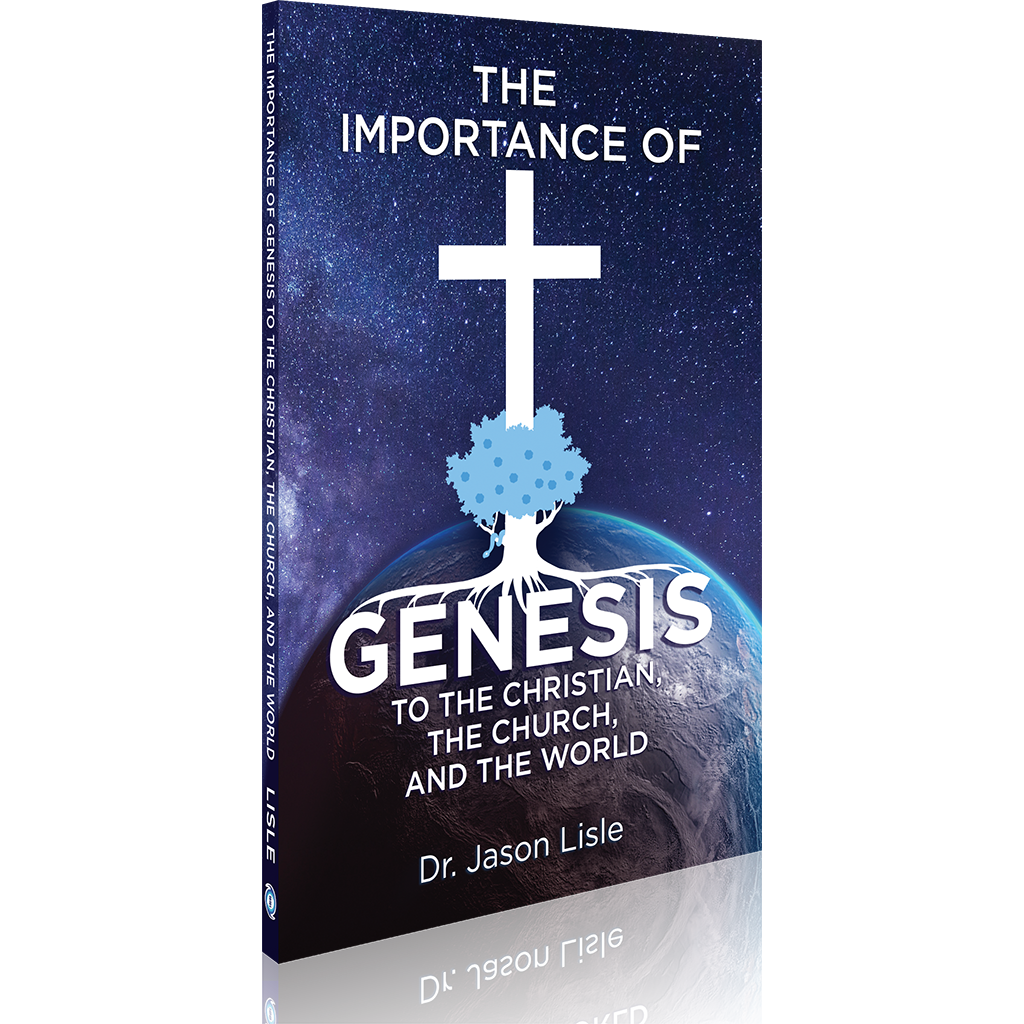
Next YouTube Live Event (Dr. Jason Lisle)
Day(s)
:
Hour(s)
:
Minute(s)
:
Second(s)
Most Recent Articles

Refuting Phillip Dennis’s Errors in Physics, ASC, and Philosophy – Part 5
We have been critiquing Phillip Dennis’s claims that the one-way speed of light must be c in all directions. Einstein claimed that the one-way speed of light was merely a humanly stipulated convention, something that we get to choose in order to define what constitutes simultaneous events that are separated by some distance. Dennis disagrees but has been unable to construct a cogent argument for his claim that doesn’t beg the question. Why does Dennis disagree with Einstein on this issue? I suggested in my previous response to Dennis that it may stem from Dennis’s philosophy of presentism. But what is presentism? Is it a self-consistent, logical philosophy? Is presentism compatible with Scripture?

Refuting Phillip Dennis’s Errors in Physics, ASC, and Philosophy – Part 4
In this article, we will examine a particularly embarrassing mistake made by Phillip Dennis in his fallacious attempt to prove the one-way speed of light in all directions must be the same as the round-trip speed. As with all his previous attempts, we will find that Dennis committed the fallacy of begging the question. Namely, he tacitly assumed an equation that arbitrarily presupposes the one-way speed of light at the start. This was the same error made in his previous attempts that I refuted last year (Lisle 2024). What makes his latest mistake particularly embarrassing is that it has already been refuted over 100 years ago (Eddington 1923)! Moreover, it has been refuted multiple times in the last century – including in my book, the Physics of Einstein (Lisle 2018).

Refuting Phillip Dennis’s Errors in Physics, ASC, and Philosophy – Part 3
We have been analyzing the claims of Phillip Dennis and his criticism of the ASC model. In particular, Dennis claims to have refuted the conventionality thesis – Einstein’s claim that the one-way speed of light “is in reality neither a supposition nor a hypothesis about the physical nature of light, but a stipulation which I can make of my own freewill in order to arrive at a definition of simultaneity” [emphasis in original] (Einstein 1916). Conversely, Dennis claims that Einstein is wrong and that the one-way speed of light is necessarily the same as the round-trip speed of light: c = 186,282.397 miles per second in vacuum. However, we have already shown that Dennis’s previous attempts to prove this were fallacious because they begged the question. That is, Dennis had used equations that tacitly assume the one-way speed of light. In his latest article, Dennis claims that the one-way speed of light has been empirically measured in two independent experiments. We will examine the first of these here. We will again show that Dennis has once again begged the question. That is, he unwittingly assumed the one-way speed of light is isotropic in his argument.

Refuting Phillip Dennis’s Errors in Physics, ASC, and Philosophy – Part 2
In this article, we review – at a layman level – the original argument that Phil Dennis made against ASC and my refutation of his claims. This is important for two reasons. First, Dennis’s first article contained a great deal of mathematics, and this required me to reply in kind. Therefore, my goal here is to explain the disagreement between us without using any equations so that the layman may understand the essence of the dispute.
Refuting Phillip Dennis’s Errors in Physics, ASC, and Philosophy – Part 1
This article series will be very important for those interested in the distant starlight issue. Secular astronomers claim that the light from the most distant galaxies has taken billions of years to reach Earth. We can see these galaxies in our most powerful telescopes. Many people conclude from this that the universe must be billions of years old, and therefore that the biblical description of creation is false. But the notion that light takes billions of years to get from distant galaxies to Earth is predicated upon a particular modern convention of how we choose to define the timing of distant events.

The Scopes Monkey Trial Centennial – Part 2
The Scopes trial of 1925 was a pivotal case for the teaching of evolution in public schools. At that time the State of Tennessee did not permit the evolution of man from lower primates to be taught in state-funded schools according to the Butler Act. Many other states had similar laws. The ACLU sought to challenge the validity of this law by offering to defend anyone accused of violating it. John Scopes agreed to be prosecuted. From a legal perspective, the trial was about whether Scopes had violated the Butler Act. But the defense attorney Clarence Darrow wanted to use this trial to discredit Christianity in general and creation in particular. He secured the written testimony of eight experts on the science of evolution. None of these were seen by the jury because the judge ruled that they were irrelevant to the legal issue of the trial. We examined three of these expert testimonies in part 1 and found that their arguments have not aged well. We here examine the testimonies of the remaining five experts.

The Scopes Monkey Trial Centennial – Part 1
July 10, 2025, marked the 100th anniversary of the start of the famous “Scopes Monkey Trial,” in which John Scopes was accused of teaching evolution in violation of the Butler Act. The trial was the inspiration for the heavily fictionized play (and subsequent movies) Inherit the Wind. The Scopes trial was considered a victory for the teaching of evolution in public schools. But what actually happened at this trial? Was the scientific evidence really a powerful refutation of biblical creation? Would it stand up to modern scrutiny?
Refuting Phillip Dennis’s Errors in Physics, ASC, and Philosophy – Part 5
We have been critiquing Phillip Dennis’s claims that the one-way speed of light must be c in all directions. Einstein claimed that the one-way speed of light was merely a humanly stipulated convention, something that we get to choose in order to define what constitutes simultaneous events that are separated by some distance. Dennis disagrees but has been unable to construct a cogent argument for his claim that doesn’t beg the question. Why does Dennis disagree with Einstein on this issue? I suggested in my previous response to Dennis that it may stem from Dennis’s philosophy of presentism. But what is presentism? Is it a self-consistent, logical philosophy? Is presentism compatible with Scripture?
Refuting Phillip Dennis’s Errors in Physics, ASC, and Philosophy – Part 4
In this article, we will examine a particularly embarrassing mistake made by Phillip Dennis in his fallacious attempt to prove the one-way speed of light in all directions must be the same as the round-trip speed. As with all his previous attempts, we will find that Dennis committed the fallacy of begging the question. Namely, he tacitly assumed an equation that arbitrarily presupposes the one-way speed of light at the start. This was the same error made in his previous attempts that I refuted last year (Lisle 2024). What makes his latest mistake particularly embarrassing is that it has already been refuted over 100 years ago (Eddington 1923)! Moreover, it has been refuted multiple times in the last century – including in my book, the Physics of Einstein (Lisle 2018).
Refuting Phillip Dennis’s Errors in Physics, ASC, and Philosophy – Part 3
We have been analyzing the claims of Phillip Dennis and his criticism of the ASC model. In particular, Dennis claims to have refuted the conventionality thesis – Einstein’s claim that the one-way speed of light “is in reality neither a supposition nor a hypothesis about the physical nature of light, but a stipulation which I can make of my own freewill in order to arrive at a definition of simultaneity” [emphasis in original] (Einstein 1916). Conversely, Dennis claims that Einstein is wrong and that the one-way speed of light is necessarily the same as the round-trip speed of light: c = 186,282.397 miles per second in vacuum. However, we have already shown that Dennis’s previous attempts to prove this were fallacious because they begged the question. That is, Dennis had used equations that tacitly assume the one-way speed of light. In his latest article, Dennis claims that the one-way speed of light has been empirically measured in two independent experiments. We will examine the first of these here. We will again show that Dennis has once again begged the question. That is, he unwittingly assumed the one-way speed of light is isotropic in his argument.
Refuting Phillip Dennis’s Errors in Physics, ASC, and Philosophy – Part 2
In this article, we review – at a layman level – the original argument that Phil Dennis made against ASC and my refutation of his claims. This is important for two reasons. First, Dennis’s first article contained a great deal of mathematics, and this required me to reply in kind. Therefore, my goal here is to explain the disagreement between us without using any equations so that the layman may understand the essence of the dispute.
Refuting Phillip Dennis’s Errors in Physics, ASC, and Philosophy – Part 1
This article series will be very important for those interested in the distant starlight issue. Secular astronomers claim that the light from the most distant galaxies has taken billions of years to reach Earth. We can see these galaxies in our most powerful telescopes. Many people conclude from this that the universe must be billions of years old, and therefore that the biblical description of creation is false. But the notion that light takes billions of years to get from distant galaxies to Earth is predicated upon a particular modern convention of how we choose to define the timing of distant events.
The Scopes Monkey Trial Centennial – Part 2
The Scopes trial of 1925 was a pivotal case for the teaching of evolution in public schools. At that time the State of Tennessee did not permit the evolution of man from lower primates to be taught in state-funded schools according to the Butler Act. Many other states had similar laws. The ACLU sought to challenge the validity of this law by offering to defend anyone accused of violating it. John Scopes agreed to be prosecuted. From a legal perspective, the trial was about whether Scopes had violated the Butler Act. But the defense attorney Clarence Darrow wanted to use this trial to discredit Christianity in general and creation in particular. He secured the written testimony of eight experts on the science of evolution. None of these were seen by the jury because the judge ruled that they were irrelevant to the legal issue of the trial. We examined three of these expert testimonies in part 1 and found that their arguments have not aged well. We here examine the testimonies of the remaining five experts.
The Scopes Monkey Trial Centennial – Part 1
July 10, 2025, marked the 100th anniversary of the start of the famous “Scopes Monkey Trial,” in which John Scopes was accused of teaching evolution in violation of the Butler Act. The trial was the inspiration for the heavily fictionized play (and subsequent movies) Inherit the Wind. The Scopes trial was considered a victory for the teaching of evolution in public schools. But what actually happened at this trial? Was the scientific evidence really a powerful refutation of biblical creation? Would it stand up to modern scrutiny?
New Resource!
Forum
Ask questions in the online forum and have them answered by Dr. Jason Lisle and other Ph.D. scientists.
Partner
Article Archives
Live Events
February 26, Alamosa, CO
Adams State University
Christian Challenge
6:30 p.m. The Ultimate Proof of Creation
February 27 – March 1, Alamosa, CO
San Luis Valley Calvary
2/27 6:30 p.m. Dinosaurs & the Bible
2/28 6:30 p.m. Astronomy Reveals Creation
3/1 9:30 a.m. The Importance of Genesis
March 19-21 Turner, OR
Oregon Leadership & Ministry Workers Conference
Aldersgate Conference Center
March 22 McMinnville, OR
Calvary Chapel McMinnville
9:00 a.m. The Importance of Genesis
11:00 a.m. The Importance of Genesis
April 12 Howard, CO
Christ Chapel of the Sangres
9:30 a.m. Worlds of Creation
10:30 a.m. The Importance of Genesis
April 23-25 Tri-Cities, WA
Pacific North West Leadership & Ministry Workers Conference
Calvary Chapel Tri-Cities
April 26-27 Tri-Cities, WA
Calvary Chapel Tri-Cities
April 26 Deer Park, WA
Calvary Chapel Deer Park
6:00 p.m. Worlds of Creation
7:00 p.m. Astronomy Reveals Creation
8:10 p.m. Q&A
May 31 – June 1 Middlebury, IN
Pathway Life Church
Subscribe to Newsletter






